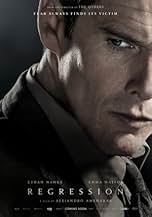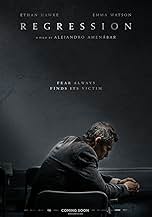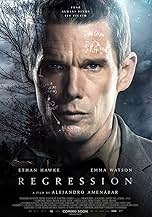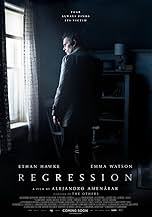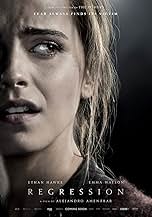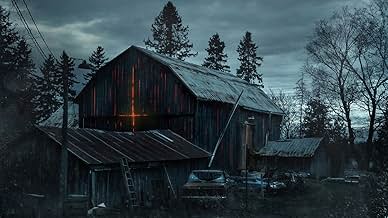ÉVALUATION IMDb
5,6/10
43 k
MA NOTE
Un détective et un psychanalyste découvrent des preuves d'un culte satanique en enquêtant sur le passé terrifiant d'une jeune femme.Un détective et un psychanalyste découvrent des preuves d'un culte satanique en enquêtant sur le passé terrifiant d'une jeune femme.Un détective et un psychanalyste découvrent des preuves d'un culte satanique en enquêtant sur le passé terrifiant d'une jeune femme.
- Prix
- 1 victoire et 2 nominations au total
Histoire
Le saviez-vous
- Anecdotes"Satanic Panic" is the name of the cultural obsession with "Satanic Ritual Abuse" which originated in the United States in the 1980s with the now-discredited memoir-style book "Michelle Remembers," written by Canadians Michelle Smith and her husband, psychiatrist Lawrence Pazder. The authors made waves during the 80's by traveling the talk-show circuit and testifying as expert witnesses in criminal trials alleging Satanic abuse. The book and Smith are represented in the film as "In Satan's Name" by S. Cooper, who is shown as a TV interview subject whose face is obscured in shadow to hide her identity.
- GaffesThe poster of Polish Death/Black Metal Band Behemoth is from 2014 whereas the film is set in 1990.
- Citations
Bruce Kenner: I am starting to use my head again.
- ConnexionsFeatured in Projector: Macbeth/Regression (2015)
- Bandes originalesThat's Where the Blues Begin
Written by Thomm Jutz and Peter Cronin
Music Library & SFX SL / Audio Network Ltd
Commentaire en vedette
For a long time, Alejandro Amenabar has been one of my favorite writer- directors for the twisted suspense thrillers. He was quite prolific at the turn of the century -- "Thesis" (1996), "Open Your Eyes" (1997) and his English-language debut "The Others" (2001). His biographical drama "The Sea Inside" won an Oscar for Best Foreign Language Film in 2004.
Since then though, his output had been sparse. That was why when I heard that he will be releasing a new film this year entitled "Regression," I made sure I went to watch it.
Seventeen-year old Angela Gray accuses her father of sexually abusing her. Detective Bruce Kenner is assigned to her case. The father meekly admits to the crime, but does not actually recall doing it. Kenner seeks the help of Psychology professor Kenneth Raines to elicit his repressed memories, as well as those of the other members of the Gray family, via hypnotic regression. What is revealed from these sessions are diabolical confessions of such disturbing nature that Kenner himself could not get them out of his own mind.
Ethan Hawke is such a good actor, really. From his feature debut in "Dead Poet's Society," then "Before Sunrise" (and its series), "Gattaca," "Sinister" to his Oscar-nominated performances in "Training Day" and "Boyhood," this guy can really portray the most ordinary characters and wind up making them very memorable. His intense take of the obsessed Bruce Kenner was riveting and infectious. His visions become our visions, his beliefs our beliefs. He had a flawless interactive rapport with Amenabar's camera, registering and conveying the anger, paranoia, confusion, and fear of his character so well on screen.
Emma Watson returns on her trajectory to becoming a serious movie actress after being sidelined by unfortunate roles in "This is the End" and "Noah." The talent and the promise are there, but the connection with her role as the troubled Angela was not as convincing as that of Hawke's. Her best performances were still those for Hermione Granger. Her young adult performances in films like "Perks of Being a Wallflower" and "The Bling Ring" had a certain unnatural stiffness in them, as it was again here as well.
Credible supporting performances were given by David Thewlis as the authoritative Prof. Raines and David Dencik as Angela's repentant father John. Going a bit over the top was Dale Dickey and her exaggeratedly demented performance as Angela's grandmother Rose. The strangest casting decision was that of Lothaire Bluteau as the priest Reverend Murray. He exuded such a creepy vibe, which of course may be the director's intention.
While "Regression" was still not on the same level of excellence as "Open Your Eyes" or "The Others," Alejandro Amenabar returned to form with this comeback project of sorts. The script, though weak and flawed in certain aspects (like motive, for one important example), was still logical and grounded despite dealing with controversial religious and psychological matters. The storytelling engages you despite the dark unpleasant topics and relentlessly morbid atmosphere. I am looking forward to the next Amenabar opus. I hope it does not take so many years anymore. 7/10
Since then though, his output had been sparse. That was why when I heard that he will be releasing a new film this year entitled "Regression," I made sure I went to watch it.
Seventeen-year old Angela Gray accuses her father of sexually abusing her. Detective Bruce Kenner is assigned to her case. The father meekly admits to the crime, but does not actually recall doing it. Kenner seeks the help of Psychology professor Kenneth Raines to elicit his repressed memories, as well as those of the other members of the Gray family, via hypnotic regression. What is revealed from these sessions are diabolical confessions of such disturbing nature that Kenner himself could not get them out of his own mind.
Ethan Hawke is such a good actor, really. From his feature debut in "Dead Poet's Society," then "Before Sunrise" (and its series), "Gattaca," "Sinister" to his Oscar-nominated performances in "Training Day" and "Boyhood," this guy can really portray the most ordinary characters and wind up making them very memorable. His intense take of the obsessed Bruce Kenner was riveting and infectious. His visions become our visions, his beliefs our beliefs. He had a flawless interactive rapport with Amenabar's camera, registering and conveying the anger, paranoia, confusion, and fear of his character so well on screen.
Emma Watson returns on her trajectory to becoming a serious movie actress after being sidelined by unfortunate roles in "This is the End" and "Noah." The talent and the promise are there, but the connection with her role as the troubled Angela was not as convincing as that of Hawke's. Her best performances were still those for Hermione Granger. Her young adult performances in films like "Perks of Being a Wallflower" and "The Bling Ring" had a certain unnatural stiffness in them, as it was again here as well.
Credible supporting performances were given by David Thewlis as the authoritative Prof. Raines and David Dencik as Angela's repentant father John. Going a bit over the top was Dale Dickey and her exaggeratedly demented performance as Angela's grandmother Rose. The strangest casting decision was that of Lothaire Bluteau as the priest Reverend Murray. He exuded such a creepy vibe, which of course may be the director's intention.
While "Regression" was still not on the same level of excellence as "Open Your Eyes" or "The Others," Alejandro Amenabar returned to form with this comeback project of sorts. The script, though weak and flawed in certain aspects (like motive, for one important example), was still logical and grounded despite dealing with controversial religious and psychological matters. The storytelling engages you despite the dark unpleasant topics and relentlessly morbid atmosphere. I am looking forward to the next Amenabar opus. I hope it does not take so many years anymore. 7/10
- 3xHCCH
- 21 oct. 2015
- Lien permanent
Meilleurs choix
Connectez-vous pour évaluer et surveiller les recommandations personnalisées
- How long is Regression?Propulsé par Alexa
Détails
- Date de sortie
- Pays d’origine
- Site officiel
- Langue
- Aussi connu sous le nom de
- Regression
- Lieux de tournage
- sociétés de production
- Consultez plus de crédits d'entreprise sur IMDbPro
Box-office
- Budget
- 20 000 000 $ US (estimation)
- Brut – États-Unis et Canada
- 55 039 $ US
- Fin de semaine d'ouverture – États-Unis et Canada
- 33 915 $ US
- 7 févr. 2016
- Brut – à l'échelle mondiale
- 17 671 101 $ US
- Durée1 heure 46 minutes
- Couleur
- Mixage
- Rapport de forme
- 2.35 : 1
Contribuer à cette page
Suggérer une modification ou ajouter du contenu manquant





